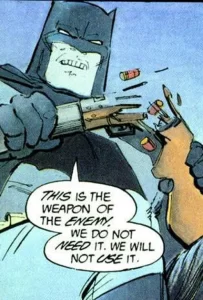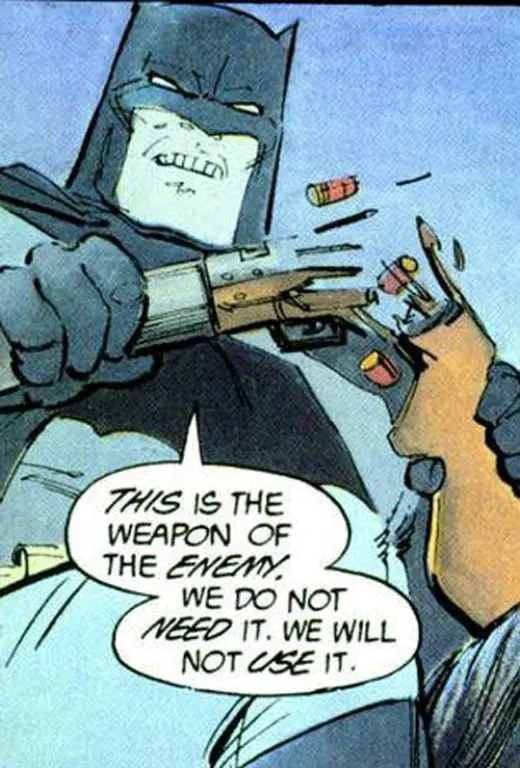Comic books, movies, and even the Bible have a thing or two to teach us about America’s good-guy, gun-totin’ hero worship.
“The only thing that stops a bad guy with a gun is a good guy with a gun.”
—Wayne LaPierre, NRA President
“Unbelievable…. They were normal people, they go to school, very very good person.”
—Rashid Haroub, former neighbor of Boston Marathon bombers Tamerlan and Dzhokhar Tsarnaev
Seventy-five years ago this week, one of America’s most iconic heroes was born. Superman first appeared in Action Comics No. 1 on April 18, 1938. According to some accounts, the Man of Steel may actually have been conceived some six years earlier in an act of gun violence. Superman co-creator Jerry Siegal’s father, Mitchell Siegal, died on June 2, 1932, during an armed robbery. As author Brad Metzler concludes, the world got Superman because “a little boy … heard his father was murdered and, in grief, created a bulletproof man.”

Frankly, as superheroes go, I find Superman a tad boring. It’s hard to identify with a guy who has laser-beam eyes and is practically invulnerable. I far prefer America’s other beloved caped crusader, Batman, whose (albeit fictitious) beginnings also stem from gun violence. Whereas Clark Kent’s sheer godliness removes him from the moral dilemmas of armed resistance, Bruce Wayne’s humanity creates the stuff of real drama. Batman is acutely aware of the razor-thin line that separates him from his enemies. For that reason, since about 1940, the Dark Knight has been an uncompromising advocate of gun control.

Frank Miller’s The Dark Knight Returns (DC Comics, 1987) was reportedly inspired by the aging figure of Dirty Harry. I find this especially curious because my all-time favorite movie remains Clint Eastwood’s Academy-award winning Unforgiven (1992)—the tale of William Munny, “a known thief and murderer, a man of notoriously vicious and intemperate disposition.”
Whereas Bruce Wayne’s superhuman intelligience and self-control separate him from the unwashed masses of humanity, Will Munny is an all-too human figure, tortured by questions of his own character and uncanny luck when it comes to killing folks. As many times as I’ve watched it, I’m still not sure what he means when he declares at the film’s climax that “deserving’s got nothing to do with it”—just before he executes town sherriff Little Bill (Gene Hackman). If nothing else, it clearly suggests that “justice” is not part of the equation.
It’s also notable that the character W. W. Beauchamp (Saul Rubinek), a writer of chapbooks on heroic gunslingers, is not so different than our modern-day comic book writers—and some journalists to boot! The genius of Unforgiven, however, is that it exposes the myth-making and leaves us pondering: Is Will Munny is a good man struggling with his sinful impulses or a bad man struggling to be good?
This brings me to the tale our our final hero, a man whom many people regard as the Superhero of Superheroes—Jesus of Nazareth. When one man ran up and asked this “good teacher” about the key to eternal life, how did he answer?
“Why do you call me good? No one is good except God alone” (Mark 10:18).
Perhaps that’s the reason He didn’t arm himself in His struggle against pride, self-righteousness, and hypocrisy.
This essay originally published on Patch.com.

